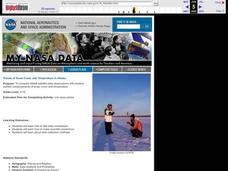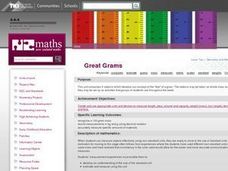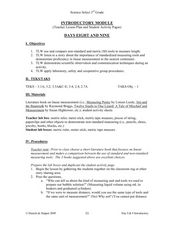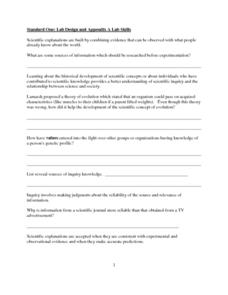Curated OER
Spoonfuls, Cupfuls and Handfuls
Explore the use of non-standard units for measuring volume with elementary learners. They fill a container and count the number used using cups, spoons, and bottles, build with blocks and count the number of blocks used, and compare and...
Code.org
Bytes and File Sizes
A bite of bits. The first instructional activity in a unit of 15 introduces the class to the byte. Pupils learn about other standard units for measuring file sizes, develop an understanding of relative sizes and the kind of units...
Curated OER
Making Simple Conversions
Young scholars explore the concept of measurement as it relates to equivalencies. They complete simple conversions using visual models of measurement units, and record their answers in a two-column table.
Curated OER
Getting it Right! An Investigation of the Pythagorean Theorem
In order to learn about the Pythagorean Theorem, young mathematicians investigate relations and patterns between different sides of a right triangle to look for possible relations among the squared sides. Once they have established the...
Curated OER
Trends of Snow Cover and Temperature in Alaska
Students gather historical snow cover and temperature data from the MY NASA DATA Web site. They compare this data to data gathered using ground measurements from the ALISON Web site for Shageluk Lake. They graph both sets of data and...
Curated OER
Look At Those Leaves!
Kids observe, classify, and measure tree leaves with a scientific eye. They examine leaves, group them according their attributes, and use standard units of measurement as they compare their sizes. They access a web site to learn how...
American Psychological Association
Using Psychological Perspectives to Answer Questions on Behavior
Perspective is everything when it comes to assessing human behavior. Class members examine a series of statements and identify the perspective represented by each to demonstrate their understanding of different psychological perspectives.
Curated OER
Line Segments and Dimensions
Fifth graders explore measurement. In this measurement lesson, 5th graders review fractions, simplifying and using rulers to practice measuring by inches and centimeters. Students are shown how to measure and given a...
NASA
Rain Gauge Activity
Complete teacher narrative and presentation slides for teaching about Earth's water make up the bulk of this lesson. Embedded within the slide show, you will find videos about the water cycle, keeping track of the limited supply of fresh...
Utah Education Network (UEN)
Insides and Outsides
Give small groups handfuls of unit cubes and then dare them to build as many rectangular prisms as possible using only 12 cubes. This engaging activity serves as an introduction to the volume of solid figures. In addition to volume,...
Curated OER
Great Grams
Students measure objects effectively using standard units, They examine how consistency in the units used allows for easier and more accurate communication of mass measures.
Curated OER
The Metric System
Students, via the newspaper, practice standard and metric measurement.
Curated OER
Basic Measurement for Welding
Students accurately measure pieces of metal. After reviewing basic math principles, groups of students identify proper and safe use of measuring devices. They discuss the safety procedures for other devices in the classroom. After a...
Curated OER
Measurement Tools
Students understand the concept of how to use different measurement tools for specific purposes. Students take pictures of various objects that can be measured using a digital camera and then making a power point presentation.
Curated OER
Algebra/Geometry Measurement
Fifth graders investigate units used to measure different geometric situations. In this geometry lesson plan, 5th graders measure length, mass, volume and temperature using units for measurements. They estimate the measurements before...
Curated OER
Measuring Marvels
Students investigate measurement. In this library lesson plan, students discuss measurement, read Millions to Measure by David Schwartz, and complete a worksheet. Extra related activities are included in the lesson plan that appeals to...
Curated OER
Fashion Day
Eighth graders practice using basic measurements to solve word problems.They also investigate finding the perimeter of different polygons and define the characteristics to classify the shape as a polygon.
Curated OER
Introductory Module
Third graders examine the non-standard method of measurement and compare it to the metric system of measurement. In this introductory module lesson, 3rd graders discover the scientific observation. Students also develop communication...
Curated OER
Measuring Angles & Segments
Young scholars view a PowerPoint for a warm-up lesson plan. They practice measuring around the classroom, measuring such things as the length and width of a desk, pencil, door, and book. Students use a website to practice measuring angles.
Curated OER
Measuring Angles
Middle schoolers explore angle measure as they estimate angle measure and measure and draw angles of less than 360 degrees. The lesson emphasizes the use of estimation when measuring angles.
Curated OER
Measuring Angles in a Triangle
High schoolers investigate the sum of the measures of the angles of a triangle. They draw a triangle and measure the interior angles. Using Cabri Jr., learners find the sum of the measures of the interior angles. The activity provides an...
Curated OER
Introduction to Measurement
Students are able to observe and measure the variability in the length of the forearm and the length of the foot and to test a common belief of the foot is equal to the length of the forearm.
Curated OER
Measures of Central Tendency
Students analyze data using central tendencies. In this statistics lesson, students collect and analyze data using the mean, median and mode. They create a power point representing the different measures of central tendency.
Curated OER
Standard One: Lab Design and Appendix A Lab Skills
In this lab design and lab skills worksheet, students answer questions about experimental design including finding variables, determining controls, and graphing data. They answer questions about microscopy and label the parts of a...























